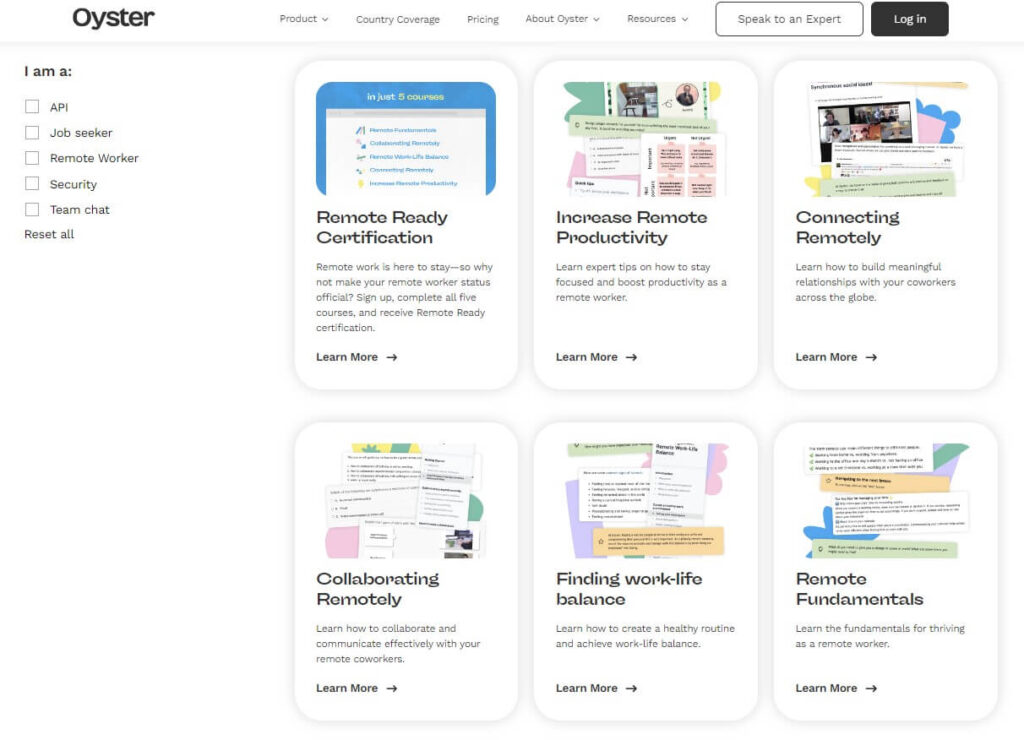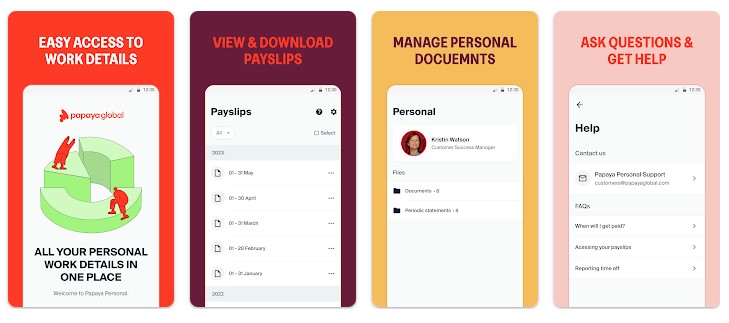Oyster and Papaya Global offer human resources (HR) for businesses with a global workforce. These two companies primarily assist in international payroll and offer employer of record (EOR) services, which allow them to handle your global employment needs. Both may have similar features, but Oyster’s international contractor payroll coverage is more extensive (180-plus vs 160-plus countries), whereas Papaya has a wider range of global workforce management solutions.
The two providers are on our lists of best international payroll software and top EOR services, but to help you determine whether Oyster vs Papaya Global is right for you, here are our recommendations:
- Oyster: Best for international payroll support and refugee hiring
- Papaya Global: Best for fast salary payouts
Want to learn more about EOR services? Read our EOR guide to get better understand how it works and when you may need one. If you need information about hiring and paying both global employees and contractors, check out the following:
- How to Hire International Employees
- How to Pay International Employees
- How to Hire International Contractors
- How to Pay International Contractors
Oyster vs Papaya Global Quick Comparison
Looking for something else? If you want an online system or service provider to help you manage US payroll, our guides to the best payroll software and top payroll services contain our recommended solutions. If you need help deciding which provider to choose, read our guide on how to select a payroll service for your business.
Best in Value: Tie
Oyster | Papaya Global | |
|---|---|---|
Free Plan | New clients can create an account and access its platform for free (monthly fees will start if they hire workers) | ✕ |
First month is free for the contractor plan | ✕ | |
Monthly Pricing for EOR Plans | Employee: Starts at $599 per employee (or $499 per employee if billed annually) Scale: Custom-priced | Starts at $599 per employee |
Contractor Plan | $29 per contractor monthly |
|
Global Payroll Only | None | Starts at $25 per employee monthly |
Payments | Direct debit and wire transfers | Workforce Wallet** |
Local Benefits Plans | Custom-priced; fees vary depending on the country, employee age, and benefits package | Custom-priced |
Discounts | For nonprofits and B-corp businesses | For volume transactions |
Client Onboarding and Setup Fees | ✕ | ✓ |
Refundable Deposit | ✓ | ✓ |
*The Contractor Plan onboards, manages, and pays your global contractors. Meanwhile, the AOR does all that, plus it classifies contractors to ensure compliance and free you from any liabilities. **Papaya Global’s Workforce Wallet allows you to pay global contractors in at least 160 locations in their local currency. | ||
In terms of pricing transparency and having different plans for EOR and contractor payment services, it’s easy to compare Papaya Global vs Oyster because both have these features. However, it’s difficult to assess which provider offers the best value in terms of pricing and services offered because it depends on the solutions you need.
Best for Global Payroll: Oyster
Oyster | Papaya Global | |
|---|---|---|
Handles Payroll & Payroll Taxes | ✓ | ✓ |
Payroll & Hiring Coverage | Contractors: 180+ countries Employees: 130+ countries | 160+ countries for both employees and contractors |
Local Entities in Covered Countries to Handle Payroll | ✓ (in some countries) | Has a network of local partners |
Global Payment Timelines | Timelines vary depending on the bank | Immediate payments or up to 72 hours |
Time Tracking | In select countries (visit Oyster’s website to learn more) | ✓ |
Time Off Requests & Approvals | ✓ | ✓ |
Adhoc Payments | Reimbursements, expenses, allowances, bonuses, and commissions | Expenses, allowances, bonuses, and commissions |
Contractor Invoices | System automatically generates monthly invoices | Contractors prepare and submit invoices online |
In terms of assessing Papaya vs Oyster for global pay processing, we found Oyster as a better option overall because its payroll coverage is more extensive, especially for contractor payments (180-plus vs 160-plus countries). Plus, it has locally owned entities in some of the countries it services that directly handle your payroll—unlike Papaya, which has a network of vetted third-party in-country partners.
Oyster also handles reimbursements with ease given its built-in reimbursement tool. Contractors also don’t have to worry about creating and submitting invoices for client payments because the system will automatically generate these every first day of the month.
On the other hand, Papaya is great for global businesses that prefer fast payments. It can handle cross-border payouts with payments made either immediately or within 72 hours. It also has secure payment deliveries and banking rails, made possible through its partnership with J.P. Morgan and Citibank. It even offers the Global Workforce Wallet, which lets you fund one virtual payroll bank account in the currency of your choice but still allows you to pay workers in their local currency in at least 160 countries (Oyster doesn’t offer this).
Best for Global HR Features: Tie
Oyster | Papaya Global | |
|---|---|---|
Online Onboarding and Offboarding Tools | ✓ | ✓ |
Employee Profiles | ✓ | ✓ |
IP Protection | ✓ | ✓ |
Localized Benefits Options | ✓ | ✓ |
International Compliance | ✓ | ✓ |
Online Contracts with Digital Signatures | ✓ | ✓ |
Other HR Features | Access to Oyster Academy with learning courses for managing remote work | Immigration support and an interactive company org chart |
Employee Self-Service Portal | ✓ | ✓ (also has a mobile app) |
Both providers have all of the basic HR features you need to handle a global workforce. It can onboard and offboard employees, save worker information in online profiles, provide IP protection and compliance support, and offer locally compliant contracts that you can review and new hires can sign off. Global employee benefits are also available with competitive plans that not only meet in-country labor rules but will also help you attract and retain employees.
While these providers have similar basic HR functionalities, there are some features that make one better than the other. Here are our recommendations for choosing between Oyster vs Papaya in terms of global HR capabilities:
Best for Reporting: Papaya Global
Oyster | Papaya Global | |
|---|---|---|
Basic Reports | ✓ | ✓ |
Customization Options | ✕ | Good |
Robust Analytics | ✕ | ✓ |
In the battle between Papaya vs Oyster for reporting capabilities, we found Papaya a better choice for those needing robust reports. Aside from standard reports with customization options, it has over 20 native analytics dashboards that you can use. If you get its Data and Insights Platform License add-on, you can analyze headcount and payroll costs in real time, as well as gain strategic insights into your business.
With Oyster, you do get basic reports, but the options are limited compared to Papaya. As of this writing, it only offers reports that show payroll data, employee and contractor expenses, invoices, and team member employment and personal details. You also can’t customize these reports by adding your own data fields.
Best for Ease of Use & Customer Support: Papaya Global
Oyster | Papaya Global | |
|---|---|---|
Learning Curve | Relatively easy | Relatively easy |
Ease of Use | Good | Good |
Setup Assistance | Via online setup wizard | ✓ |
Dedicated Client Success Manager | Available in highest plan | ✓ |
Customer Support | Via chatbot, email, and help tickets raised through the Oyster portal | Via chat, email, and a dedicated point of contact |
Online Guides & Tools |
|
|
Software Integration | Some of the options include:
| Some of the options include:
|
Papaya Global is our top pick for customer support and ease of use because it handles your initial system setup and offers an online platform that’s generally simple to learn and use. While it may not have Oyster’s benefits advisor and contractor vs employee analyzer tools, Papaya provides access to a dedicated point of contact who can help answer your compliance and software-related questions.
It also seamlessly connects with NetSuite given its built-in integration and application programming interface (API) with the said business software. This makes it easy for you to create automated data maps and syncs between the two solutions for stress-free journal entry updates and reconciliations.
However, Oyster offers more integration options with accounting solutions. Aside from NetSuite, it connects with Xero and QuickBooks Online. It even integrates with Greenhouse for tracking applicants, Okta for secure logins, and Slack for chat communications with your team.
Best for Popularity Among Users: Oyster
Oyster | Papaya Global | |
|---|---|---|
User Feedback | Mostly positive | Mostly positive |
Average User Ratings* | 4.5 out of 5 | 4.55 out of 5 |
Average Number of Reviews* | More than 375 | More than 60 |
*Data from third-party review sites (such as G2 and Capterra) as of this writing | ||
To evaluate Papaya Global vs Oyster, we looked at each provider’s average number of user reviews and average overall ratings on third-party review sites like G2 and Capterra. Oyster got a higher number of reviews than Papaya (320-plus vs 60-plus) but in terms of user rating, Papaya led by a slim number (4.55 vs 4.5).
What Users Think: Oyster vs Papaya Global
Best Overall: Papaya Global
Papaya Global and Oyster have similar HR and payroll features, but Papaya Global presented other features that gave it an edge over Oyster. These include time tracking, report customizability, customer support, and transparent pricing. Papaya has a time tracking feature, while Oyster offers it to only a few countries. This can impact businesses operating in regions where time-tracking capabilities are not supported by Oyster.
Additionally, Papaya’s reporting feature offers more customization options tailored to specific countries compared to Oyster. This level of customization allows businesses to generate reports that align with the unique requirements and regulations of each country in which they operate. In terms of customer support, Papaya offers live phone and chat support, while Oyster only has chat. Having both can contribute to a more responsive and comprehensive support experience, enhancing customer satisfaction and confidence in the platform.
How We Evaluated Oyster vs Papaya Global
We compared Oyster vs Papaya by looking at several factors, such as payroll and HR features, international compliances, employee benefits options, and onboarding/offboarding processes. We also considered pricing, customer support, ease of use, reporting capabilities, and feedback that actual users left on third-party review sites.
Frequently Asked Questions (FAQs)
Global payroll outsourcing is the practice of hiring external service providers to handle payroll processes across multiple countries on behalf of a company. The outsourcing provider manages payroll operations from a centralized location, leveraging technology and standardized processes to streamline payroll management.
A global payroll platform provides a centralized solution and standardized procedures for managing payroll in different regions. On the other hand, implementing it can be complex and time-consuming, requiring significant investment in terms of money, time, resources, and training.
Bottom Line
In deciding whether to get Oyster vs Papaya Global for your EOR and global payroll needs, you should take a look at your budget and identify the features your business really needs. Papaya Global is great for contractor payments given its affordable contractor plan. While its EOR service is pricier than Oyster, it can help you hire full-time employees in over 160 countries (130-plus for Oyster).
On the other hand, Oyster is optimal for companies looking for a reasonably priced EOR service to hire and pay workers. It doesn’t charge setup and onboarding fees like Papaya does and offers free refugee hiring for up to 10 workers for eligible organizations. It even has employee misclassification and benefit assessment tools that you can use at no cost.




